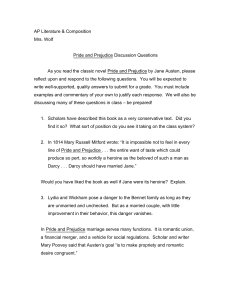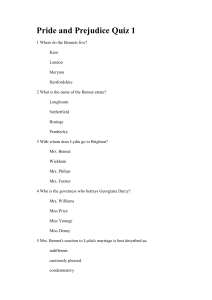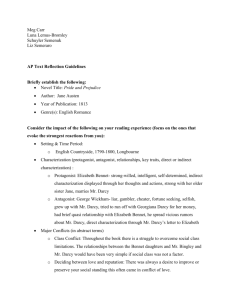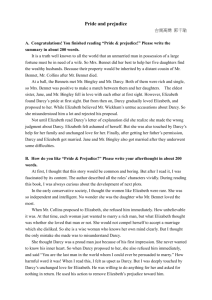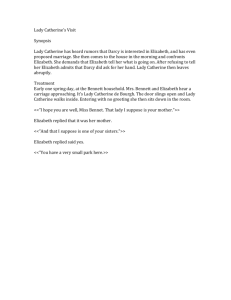Pride and Prejudice Ch_ 15-18
advertisement
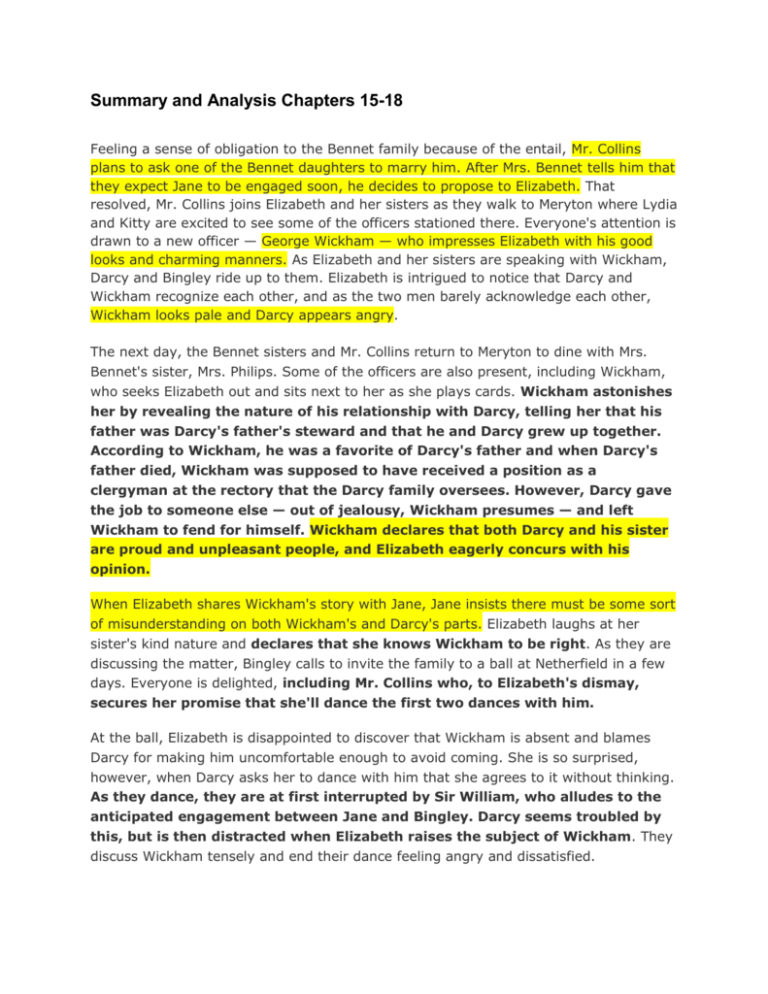
Summary and Analysis Chapters 15-18 Feeling a sense of obligation to the Bennet family because of the entail, Mr. Collins plans to ask one of the Bennet daughters to marry him. After Mrs. Bennet tells him that they expect Jane to be engaged soon, he decides to propose to Elizabeth. That resolved, Mr. Collins joins Elizabeth and her sisters as they walk to Meryton where Lydia and Kitty are excited to see some of the officers stationed there. Everyone's attention is drawn to a new officer — George Wickham — who impresses Elizabeth with his good looks and charming manners. As Elizabeth and her sisters are speaking with Wickham, Darcy and Bingley ride up to them. Elizabeth is intrigued to notice that Darcy and Wickham recognize each other, and as the two men barely acknowledge each other, Wickham looks pale and Darcy appears angry. The next day, the Bennet sisters and Mr. Collins return to Meryton to dine with Mrs. Bennet's sister, Mrs. Philips. Some of the officers are also present, including Wickham, who seeks Elizabeth out and sits next to her as she plays cards. Wickham astonishes her by revealing the nature of his relationship with Darcy, telling her that his father was Darcy's father's steward and that he and Darcy grew up together. According to Wickham, he was a favorite of Darcy's father and when Darcy's father died, Wickham was supposed to have received a position as a clergyman at the rectory that the Darcy family oversees. However, Darcy gave the job to someone else — out of jealousy, Wickham presumes — and left Wickham to fend for himself. Wickham declares that both Darcy and his sister are proud and unpleasant people, and Elizabeth eagerly concurs with his opinion. When Elizabeth shares Wickham's story with Jane, Jane insists there must be some sort of misunderstanding on both Wickham's and Darcy's parts. Elizabeth laughs at her sister's kind nature and declares that she knows Wickham to be right. As they are discussing the matter, Bingley calls to invite the family to a ball at Netherfield in a few days. Everyone is delighted, including Mr. Collins who, to Elizabeth's dismay, secures her promise that she'll dance the first two dances with him. At the ball, Elizabeth is disappointed to discover that Wickham is absent and blames Darcy for making him uncomfortable enough to avoid coming. She is so surprised, however, when Darcy asks her to dance with him that she agrees to it without thinking. As they dance, they are at first interrupted by Sir William, who alludes to the anticipated engagement between Jane and Bingley. Darcy seems troubled by this, but is then distracted when Elizabeth raises the subject of Wickham. They discuss Wickham tensely and end their dance feeling angry and dissatisfied. At dinner, Elizabeth is mortified by her mother's incessant chatter to Lady Lucas about Jane and Bingley getting engaged. She notices that Darcy can't help but hear her mother's loud whispers and unsuccessfully encourages her mother the change the subject. After dinner, Elizabeth's sense of humiliation grows as her parents and all of her sisters except Jane act foolishly and without restraint. Mr. Collins adds to her misery by continuing to hover near her, causing Elizabeth to be grateful when Charlotte engages him in conversation. Analysis With the introduction of Wickham to the novel, the plot begins to become more complicated. Note that even though Elizabeth is perceptive enough to immediately sense that something is wrong between Wickham and Darcy, her perceptive abilities where Darcy and Wickham are concerned will be blinded by her prejudice, rendering her unable to see Darcy's or Wickham's true natures. Elizabeth's prejudices stem from her first impressions of the men. Whereas she was initially repulsed by Darcy's arrogant and reserved manners and his insulting refusal to dance with her, she is attracted to Wickham's "happy readiness of conversation — a readiness at the same time perfectly correct and unassuming." Additionally, Wickham further pleases Elizabeth by favoring her with his attention at her aunt's house. In other words, Wickham has behaved opposite to Darcy in his first encounters with Elizabeth, appealing to her appreciation of friendly manners and conversation as well as to her pride in being the woman he chose to sit with. (He has appealed to her pride! …and to her prejudice against Darcy for his early comments.) Consequently, Elizabeth's prejudice is so strong against Darcy and for Wickham that she will accept at face value everything that Wickham says. As Wickham talks about Darcy's pride, Elizabeth fails to note that her own pride is blinding her to a basic incongruity. Wickham professes to be discreet and hints that he would not defame anyone's character, but he talks extensively about Darcy. Elizabeth would not have tolerated such a conversation if anyone except the disagreeable Mr. Darcy were the subject of the talk. Austen emphasizes a theme of prejudice as Wickham imposes his prejudice upon Elizabeth and makes her even more prejudiced against Darcy, who, it is hinted, is prejudiced against all people. Note also in these chapters the examples of the importance of manners and decorum in nineteenth-century British society. In observing the characters' behaviors and comments, it seems that in society, manners are associated with social class and accordingly with the quality of a person's character. So, for example, members of the aristocracy, such as Darcy or Lady Catherine De Bourgh, are perceived as justifiably proud in their manners because of their status in society. The Bingley sisters, who aspire to that level, are also proud and careful in their manners and distinguish with whom they associate among the Bennet family based on manners. Jane and Elizabeth, who display proper behavior, are acceptable, while Mrs. Bennet, Mary, Kitty, and Lydia, who speak and act on whim with no thought for appropriateness, are shunned. The differences in the Bennet girls' manners could be viewed from a societal perspective as reflecting the differences in their parents' class and backgrounds: Jane and Elizabeth are more closely associated with their father, a landowning gentleman, whereas Mary, Kitty, and Lydia emulate their mother, the daughter of a lawyer. However, Austen's sense of irony comes through as she plays with this traditional societal perception of class and manners. Throughout the novel, she satirizes the manners of all classes, exposing people who have excessive pride as rude and often foolish, regardless of wealth or station. In these chapters, Austen uses Mr. Collins as an extreme example of how excessive pride can affect one's manners. In Mr. Collins' case, he prides himself on his sense of respectability, his profession, and his association with Lady Catherine. As a result, he behaves in a ridiculous fashion, going so far as to break one of society's rules and introduce himself to Darcy rather than waiting for Darcy to acknowledge their connection. Similarly, Mrs. Bennet appears absurd as she ignores decorum and talks unrestrainedly about Jane's prospective marriage to Bingley. With both Mr. Collins and Mrs. Bennet, Elizabeth acts as the voice of propriety, explaining to her unreceptive relations the proper way to behave. The behavior of Elizabeth's family at the Netherfield ball embarrasses her because she understands the proper and improper modes of conduct at such an event. Remember also that Elizabeth's sense of etiquette has affected her perceptions of Wickham and Darcy — one man behaved appropriately upon their first meeting and the other did not. Austen's heroine seems to have a very democratic sense of proper manners, for rather than judging people by their class, she evaluates them based on how they treat others. Consequently, she likes Bingley and Wickham, who treat everyone equally, but dislikes Bingley's sisters and Darcy, who appear overly proud. Glossary living in England, a church benefice (an endowed church office providing a living for a vicar or rector). the living of Hunsford the endowed office provided for the vicar or rector in the town of Hunsford. veneration a feeling of deep respect and reverence. obsequiousness the showing of too great a willingness to serve or obey; a fawning. amiable having a pleasant and friendly disposition; good-natured. represented described as having a specified character or quality. prepossession the fact or condition of preoccupying (someone) beforehand, to the exclusion of later thoughts or feelings. incumbent lying, resting, or pressing with its weight on something else. folio a large size of book, about twelve by fifteen inches. cessation a ceasing, or stopping, either forever or for some time. muslin a strong, often sheer cotton cloth of plain weave. commission an official certificate conferring rank. corps a tactical subdivision of an army. regimentals military uniform. very pleasing address pleasing conversational manner. game of lottery tickets a card game. the chimney-piece [Obsolete] a decoration over a fireplace. imitations of china paintings on china. the fish betting chips in a game. wonderful causing wonder; amazing. veracity habitual truthfulness; honesty. shoe-roses shoe laces that are ribbons tied to look like a rose. hauteur disdainful pride; haughtiness; snobbery. steward a person put in charge of the affairs of a large household or estate, whose duties include supervision of the kitchen and the servants and the management of household accounts. insolent boldly disrespectful in speech or behavior; impertinent; impudent. probity uprightness in one's dealings; integrity. imprudent not prudent; without thought of the consequences; lacking in judgment or caution; rash; indiscreet. her manner affected behaving in an artificial way to impress people; full of affectation. tythes units that are one tenth of the annual produce of one's land or of one's annual income, paid as a tax or contribution to support a church or its clergy; any taxes or levies. conciliatory tending to conciliate or reconcile (to win over; soothe the anger of; make friendly; placate). Cliff's Notes Summary and AnalysisChapters 19-23 Summary The morning after the Netherfield ball, Mr. Collins proposes to Elizabeth. He outlines his motivation for proposing and promises never to bring up the fact that she brings so little money to the marriage. Torn between discomfort and the desire to laugh at his officious manner, Elizabeth politely refuses him. Mr. Collins, however, thinks that Elizabeth is being coy in refusing him and lists the reasons why it is unthinkable for her to refuse him — namely his own worthiness, his association to the De Bourgh family, and Elizabeth's own potential poverty. Mrs. Bennet, who is anxious for Elizabeth to accept Mr. Collins, reacts badly to the news of her daughter's resistance and threatens never to see Elizabeth again if she doesn't marry him. When Mrs. Bennet appeals to Mr. Bennet for support, though, he states that he would never want to see Elizabeth again if she did marry Mr. Collins. Mr. Collins finally realizes that his suit is hopeless and he withdraws his offer. In the midst of the uproar over the proposal, Charlotte Lucas visits the Bennets and learns of Elizabeth's refusal of Mr. Collins. After Mr. Collins withdraws his offer, Charlotte begins spending more time with him, and within a few days, he proposes to her. Charlotte accepts, not for love but for security, and news of their engagement outrages Mrs. Bennet and shocks Elizabeth, who cannot believe her friend would marry where no love exists. Meanwhile, Bingley leaves for what is supposed to be a temporary visit to London, but Jane receives a letter from Caroline Bingley stating that the whole party has left for London and will not return all winter. Caroline tells Jane that they are spending a great deal of time with Georgiana Darcy and hints that she would like Miss Darcy to marry her brother. Jane is dismayed by the news, but believes that Caroline's letter is written in friendship and goodwill. Elizabeth, on the other hand, is suspicious of the role Darcy and Bingley's sisters may be playing in keeping him and Jane apart. Analysis Mr. Collins' proposal to Elizabeth is one of the most humorous moments in the novel. Austen has already established the absurdities in Mr. Collins' speech and manners, but his proposal raises him to new heights of pompous foolishness. Although Elizabeth at first is desperate to get away, note how she is overcome by the humor of the situation when Mr. Collins begins to speak of his feelings running away with him. There are obviously no feelings involved in his offer other than self-pride and condescension. Austen states that as he prepares for the proposal, "he set about it in a very orderly manner, with all the observances which he supposed a regular part of the business." For Mr. Collins, this is a business transaction, not the culmination of love for Elizabeth. And as Elizabeth has stated before, she wants to marry for love, not convenience. Elizabeth's romantic view of marriage results in her feelings of shock and disappointment when Charlotte decides to marry Mr. Collins. Blind to Charlotte's practical reasons for accepting Mr. Collins, Elizabeth cannot conceive of Charlotte being happy in such a marriage. Elizabeth's view of marriage and response to Charlotte's concept of marriage are interesting considering Elizabeth's family and future prospects. In seeking a love match, Elizabeth is searching for a relationship opposite to that of her parents. Her parents neither love nor like each other, which creates a fragmented household in which neither parent seems very happy. Perhaps Elizabeth's objections to Charlotte's realistic perception of marriage are actually objections to her own parents' relationship. However, nineteenth-century readers would understand the riskiness of Elizabeth's idealistic position. As Mr. Collins is quick to point out, Elizabeth will have a severely limited income when her father dies and the estate passes to Mr. Collins. Most young women in her situation in nineteenth-century Britain might dream of marrying for love, but would accept the necessity of marrying for security, as Charlotte does. Consequently, for Austen's readers, Elizabeth represents an ideal view of the world, while Charlotte represents reality. Glossary diffidence lack of confidence in oneself. diversion distraction of attention. purport intention; object. dissemble to conceal the truth or one's true feelings or motives. vivacity liveliness of spirit; animation. one thousand pounds in the 4 per cents Elizabeth's inheritance upon her mother's death will be 1,000 pounds, which will be invested in secure government bonds that generally yield four or five percent annually. ere before. sanctioned authorized or permitted. coquetry the behavior or act of a coquette; flirting. vestibule a small entrance hall or room. felicitations congratulations. peevish hard to please; irritable; fretful; cross. assiduous diligent; persevering. abatement a lessening or reduction. Grosvenor Street a street located in a fashionable part of London. make their appearance at St. James St. James' Palace was where high-born young men and women were formally presented to the court, signaling their entrance into society. coming out the formal introduction of a young woman into society. disapprobation disapproval. charged given instructions or commanded authoritatively. decorum propriety and good taste in behavior. courtier an attendant at a royal court. rectitude conduct according to moral principles; strict honesty. the business of love-making the wooing, or trying to get the love of, a woman. Summary and Analysis Chapters 24-27 (Volume II, 1-4) Jane receives another letter from Caroline Bingley and unhappily reads that the Bingleys have no plans of ever returning to Netherfield. The news leaves Jane depressed and makes Elizabeth angry. She blames Darcy and Bingley's sisters for interfering with her sister's happiness, and resents Bingley for how easily he has been manipulated by those close to him. Elizabeth's mood is lifted somewhat by frequent visits from Wickham, who continues to be attentive to Elizabeth. Mrs. Bennet's brother and sister-in-law, Mr. and Mrs. Gardiner, come to Longbourn to spend Christmas with the Bennet family. Unlike Mrs. Bennet's other relatives, the Gardiners are well-mannered and intelligent, and Jane and Elizabeth feel especially close to them. Mrs. Gardiner cautions Elizabeth against encouraging Wickham, telling her that the lack of fortune on either side makes the hope of a match between the two of them impractical and irresponsible. Mrs. Gardiner also observes Jane's melancholy and invites her to return to London with them. Jane happily accepts and anticipates being able to see Caroline Bingley while she is there. However, after Jane is in London, a chilly reception from Miss Bingley makes her realize that Elizabeth was correct in her assessment of Bingley's sister as being a false friend to Jane. Meanwhile, Mr. Collins and Charlotte Lucas marry and depart for Mr. Collins' parsonage in Hunsford, Kent. Before she leaves, Charlotte asks Elizabeth to visit her soon and Elizabeth reluctantly agrees. In March, Elizabeth accompanies Charlotte's father and younger sister, Maria, to visit Charlotte, whom Elizabeth has begun to miss. On their way to Hunsford, the group stops in London overnight to stay with the Gardiners. While there, Elizabeth and her aunt discuss Wickham's recent courtship of Miss King, an heiress. Mrs. Gardiner views his actions as mercenary, but Elizabeth defends his right to pursue a wealthy bride. Before Elizabeth leaves London, her aunt and uncle invite her to accompany them on a trip to northern England in the summer, and Elizabeth agrees. Analysis As Pride and Prejudice progresses, the novel's carefully balanced structure becomes more apparent. In these chapters, for example, Jane's disappointment in love is juxtaposed with Charlotte's marriage. Notice how neither situation fits with Elizabeth's idealistic view of life. Elizabeth believes that people should marry for love, not security, and has been very vocal on the subject. When faced with the reality of Jane's broken heart and Charlotte's practicality, Elizabeth responds with anger and resentment, unwilling to excuse or understand actions that deviate so greatly from her belief system. This attitude, especially toward Charlotte, is a sign of Elizabeth's immaturity and naiveté at this point in the book. As her beliefs continue to be challenged, however, she will mature. Elizabeth's refusal to see any viewpoint other than her own is representative of the theme of blindness, or prejudice, that runs through the book. Up to this point, Charlotte has been the main person to question Elizabeth's judgment in such a well-reasoned manner that she makes the reader question Elizabeth's perceptions as well. In these chapters, though, Mrs. Gardiner enters the plot and matches Charlotte's ability to pinpoint Elizabeth's biases and inconsistencies. For example, Mrs. Gardiner warns Elizabeth against encouraging Wickham, stating "You have sense, and we all expect you to use it." She also questions Wickham's interest in Miss King, refusing to overlook the mercenary aspect of his attentions, unlike Elizabeth who readily excuses his actions. Mrs. Gardiner's concerns seem reasonable enough to make the readers wonder if Wickham is perhaps not as trustworthy and likable as Elizabeth believes him to be. The introduction of the Gardiners to the novel presents a contrast to the rest of Mrs. Bennet's family. Unlike Mrs. Bennet and her sister, Mrs. Phillips, the Gardiners are intelligent, well-mannered, and sensitive. These differences are significant, not only because they show that Elizabeth has some relatives besides Jane that she can be proud of, but it also demonstrates that members of the middle class can be just as refined and well-bred as members of the upper class. Summary and Analysis Chapters 28-32 (Volume II, 5-9) Summary The next day, Elizabeth, Sir William, and Maria leave London for Hunsford. When they arrive at the parsonage, Charlotte and Mr. Collins greet them enthusiastically and give them a tour of the house and garden. As they settle in, Maria is excited by the brief visit from Miss De Bourgh, but Elizabeth in unimpressed. The group is invited to dine at Lady Catherine De Bourgh's residence, Rosings, soon after they arrive. Mr. Collins' dramatic descriptions of Lady Catherine and her home make Sir William and Maria nervous, but Elizabeth approaches the visit with curiosity rather than fright. As Elizabeth observes Lady Catherine, she notices that her ladyship displays tireless interests in the smallest details of life at the parsonage and in the village and never hesitates to offer her opinion or advice. Lady Catherine also turns her attention to Elizabeth and begins querying her about her family and education, and Elizabeth shocks her by initially refusing to disclose her age. After a week passes, Sir William returns home. Elizabeth spends much of her time walking outdoors, and the group dines at Rosings twice a week. The news that Darcy and his cousin Colonel Fitzwilliam will be visiting Lady Catherine, soon generates some excitement, especially after the two gentlemen call on the parsonage the morning after their arrival. Colonel Fitzwilliam impresses Elizabeth with his gentlemanlike manner, while Darcy remains as aloof as ever. About a week after Darcy and Fitzwilliam arrive at Rosings, the residents of the parsonage are again invited to dinner. Lady Catherine focuses much of her attention on Darcy, while Colonel Fitzwilliam seems taken with Elizabeth. The colonel asks Elizabeth to play the piano for him, and she complies. Darcy soon joins them at the piano and it is not long before Elizabeth and Darcy become engaged in a spirited conversation about Darcy's reserved behavior among strangers. Elizabeth reproaches him for not trying harder, while Darcy states that he simply isn't able to easily converse with people he doesn't know well. The next morning, Darcy visits the parsonage and is surprised to find Elizabeth alone. Their conversation begins in a stilted and awkward manner, but soon Elizabeth cannot resist questioning him about whether Bingley plans on returning to Netherfield. Discussion turns to Charlotte's marriage to Mr. Collins, leading to a brief debate over what is an "easy distance" for a woman to be separated from her family after she marries. Charlotte comes home and Darcy soon leaves. Surprised by his presence, Charlotte wonders if Darcy is in love with Elizabeth and closely observes him in his subsequent visits. Analysis After Elizabeth rejected Mr. Collins and then so strongly condemned Charlotte for marrying him, both Elizabeth and the reader cannot help but be curious about how Charlotte is faring in her new role as Mr. Collins' wife. From Elizabeth's observations and the narrator's descriptions, it seems that Charlotte is settling into a marriage very similar to that of Mr. and Mrs. Bennet. Just as Mr. and Mrs. Bennet are mismatched in intellect and common sense, Charlotte and Mr. Collins also display a disparity of temperament. Where Mr. Collins is overbearing and effusive in his interactions with others, Charlotte is well-mannered and modest. When the group first dines at Rosings, for example, the narrator notes the differences between how Charlotte introduces her family and friend compared to how Mr. Collins would have handled it: "as Mrs. Collins had settled it with her husband that the office of introduction should be hers, it was performed in a proper manner, without any of those apologies and thanks which he would have thought necessary." Additionally, like Mr. Bennet, Charlotte has found ways to distance herself from her exasperating spouse. Mr. Bennet uses his library as a retreat, and Charlotte similarly has chosen a sitting room for herself that Mr. Collins is less likely to invade regularly. Charlotte's approach to Mr. Collins is perhaps more respectful than Mr. Bennet's treatment of Mrs. Bennet, however. While Mr. Bennet responds to Mrs. Bennet's silliness with sarcasm, Charlotte does not react to Mr. Collins' inane statements. As Elizabeth observes, when Mr. Collins says something foolish, "Charlotte wisely did not hear." Notice how differently Elizabeth views her friend's situation now. Seeing Charlotte's new home and the dynamics of her marriage has given Elizabeth a new appreciation of her friend. Whereas Elizabeth once expressed extreme disappointment in Charlotte for choosing to marry Mr. Collins, she now admires Charlotte's ability to manage her household and her husband. (After all, who is in charge?)Elizabeth's change of heart here is subtle, but important. It demonstrates a key aspect of Elizabeth's character: the ability to change. Even when Elizabeth feels very strongly about something — in this case, Charlotte's marriage — she can be objective enough to reassess the situation and change her mind. So while she may still not agree with Charlotte's choice of husband, Elizabeth's sense of fairness allows her to eventually accept Charlotte's choice based upon her observations of Charlotte's contentment and well-managed life. Another important aspect of these chapters is Elizabeth's interaction with Lady Catherine. While Sir William and Maria are frightened by Lady Catherine's overwhelming presence, Elizabeth is unmoved by Lady Catherine's rank or personality and instead demonstrates her ability to stand up to the woman. The establishment of this ability at this point in the book prepares readers for Elizabeth's tenacity in later confrontations with Lady Catherine. Austen also reinforces Elizabeth's ability to verbally spar with Darcy. As seen previously at Netherfield, Darcy and Elizabeth cannot be in a room together for very long before they begin debating with each other. Although Elizabeth is entertained by Colonel Fitzwilliam, Austen shows little of her dialogue with the colonel. It is only when Darcy enters the conversation that the dialogue is written out, and then the quickness of Elizabeth's energy and intelligence are apparent in every line. In this choice of narrative versus dialogue, Austen conveys the chemistry that exists between Elizabeth and Darcy. Elizabeth may be charmed by Colonel Fitzwilliam's genial manners, but it is Darcy who challenges and stimulates her. Summary and Analysis Chapters 33-36 (Volume II, 10-13) Summary Elizabeth keeps encountering Darcy during her walks through the park and is bothered when, rather than leaving her alone, he continues to join her. One day, she meets Colonel Fitzwilliam as she's walking and they begin discussing Darcy's character. When Fitzwilliam relates the story of "a most imprudent marriage" that Darcy saved Bingley from, Elizabeth infers that he is speaking of Jane and reflects upon Darcy's actions with anger and tears when she returns to her room. Feeling unfit to see Lady Catherine and especially wanting to avoid Darcy, Elizabeth decides not to go to Rosings that night for dinner, telling Charlotte that she has a headache. After everyone has left for Rosings, Elizabeth is startled by the arrival of Darcy, who inquires about her health. After a few minutes of silence, Darcy shocks Elizabeth with a declaration of love for her and a proposal of marriage. Initially flattered by his regard, Elizabeth's feelings turn to outrage as Darcy catalogs all of the reasons why he has resisted his feelings for her — namely how her inferior social class would degrade his own standing and the problem of her family. Elizabeth in turn stuns Darcy by refusing his proposal, stating, "I had not known you a month before I felt that you were the last man in the world whom I could ever be prevailed on to marry." She condemns him for separating Jane and Bingley, for treating Wickham poorly, and for his arrogance and selfishness. He accepts these accusations without apology, even with contempt. However, he flinches when she accuses him of not behaving like a gentleman and when Elizabeth finishes her denunciation of him, Darcy angrily departs. Overwhelmed with emotion, Elizabeth cries for a half hour afterward and retreats to her room when everyone returns home. As Elizabeth is walking the next morning, Darcy approaches her, gives her a letter, and leaves her alone to read it. In the letter, Darcy does not renew his marriage proposal, but instead addresses Elizabeth's two main objections to him: his involvement in Jane and Bingley's breakup and his treatment of Wickham. Regarding Jane and Bingley, Darcy states that he believed that Jane did not love Bingley, and he consequently persuaded Bingley that it was so, as well. He admits that he wanted to save Bingley from an imprudent marriage, but he stresses that he felt that Jane's feelings were not deeply involved because her calm nature never displayed any indication of her strong attachment. Darcy adds that Jane's mother, her three younger sisters, and even her father act improperly in public and create a spectacle of themselves. As for Wickham, Darcy states that he is a pleasant but unprincipled man who is greedy and vengeful. Contrary to Wickham's account, Darcy asserts that he did not deprive Wickham of the clergyman position without compensation. Instead, as Wickham's request, Darcy gave him 3,000 pounds to use to study law. Wickham squandered the money, tried to get more from Darcy, and when that failed, tried to elope with Darcy's sister. Darcy directs Elizabeth to ask Colonel Fitzwilliam for confirmation of anything she questions in his letter. At first, Elizabeth refuses to believe the letter, but after rereading it and thinking back on the circumstances Darcy recounts, she soon realizes, with a great deal of shock and chagrin, that it is completely true. Reflecting upon her former behavior and views, she is horrified and ashamed and exclaims, "I have courted prepossession and ignorance, and driven reason away, where either were concerned. Till this moment, I never knew myself." Depressed and ashamed, she finally returns to the parsonage, and learns that both Darcy and Colonel Fitzwilliam had visited and gone. Analysis These chapters are among the most important of the novel. They present the plot's climax — the turning point of the action of the novel — and the beginning of the denouement — the resolution of the plot. Here, Elizabeth experiences her great self-revelation about her prejudices, and Darcy receives a similar blow to his own expectations and perceptions of the world. Austen has carefully structured the plot so that Darcy's proposal comes at the height of Elizabeth's anger toward him. Elizabeth's conversation with Colonel Fitzwilliam leaves her so upset and resentful of Darcy that she makes herself sick thinking about how he has harmed her sister. Her feelings are such that she cannot bear the thought of seeing him. At the same time, Darcy's feelings for Elizabeth have reached the point of compelling him to go to her and expose his heart, leading to his outburst, "In vain have I struggled. It will not do. My feelings will not be repressed. You must allow me to tell you how ardently I admire and love you." The proposal itself is filled with pride as Darcy refers to all the obstacles which he has had to overcome in order to make himself take this step. Rather than emphasizing his love for Elizabeth, he focuses on the negatives of the situation and makes disparaging comments about her family. Meanwhile, the proposal completely stuns Elizabeth. She has been blind to Darcy's affections for her because she has been so prejudiced against him. Note that throughout the scene, Darcy accuses Elizabeth of pride, while Elizabeth accuses him of prejudice — an ironic reversal of the way readers have viewed each character. Elizabeth tells him that he was prejudiced against Wickham, against Jane, and against things that do not fit into his social world. In turn, he tells her that she would not be so adamant "had not your pride been hurt by my honest confession." This ironic reversal emphasizes that both Elizabeth and Darcy have been guilty of both pride and prejudice. Darcy's letter is important in three ways. First, it clarifies plot points from earlier in the book by explaining exactly what Darcy's role was in Bingley's sudden departure and Wickham's job problems. Secondly, the letter provides the reader with invaluable insights into Darcy's mind and personality. Because most of the story is told from Elizabeth's perspective, readers have little chance to know Darcy beyond his outward behavior. But the most important aspect of the letter is the impact it has on Elizabeth. Through Elizabeth's reactions to the letter, Austen masterfully displays the process of revelation and self-discovery. Watch the gradual method by which Elizabeth comes to a self-revelation of her own pride and prejudice. She begins reading the letter "with a strong prejudice against everything he might say." Then as she reads the letter a second and a third time, one or two things begin to strike her as being true. After she has brought herself to accept one statement as being true, she realizes that she must ultimately accept every fact as true or reject them all. Her final realization is that she has been "blind, partial, prejudiced and absurd." Previously, she had called Jane blind, and now she has gained a moral insight into her own character and sees that she has also been blind. This, therefore, is her crucial recognition about herself. Consequently, Elizabeth's character increases in depth as she is able to analyze herself and come to these realizations.
